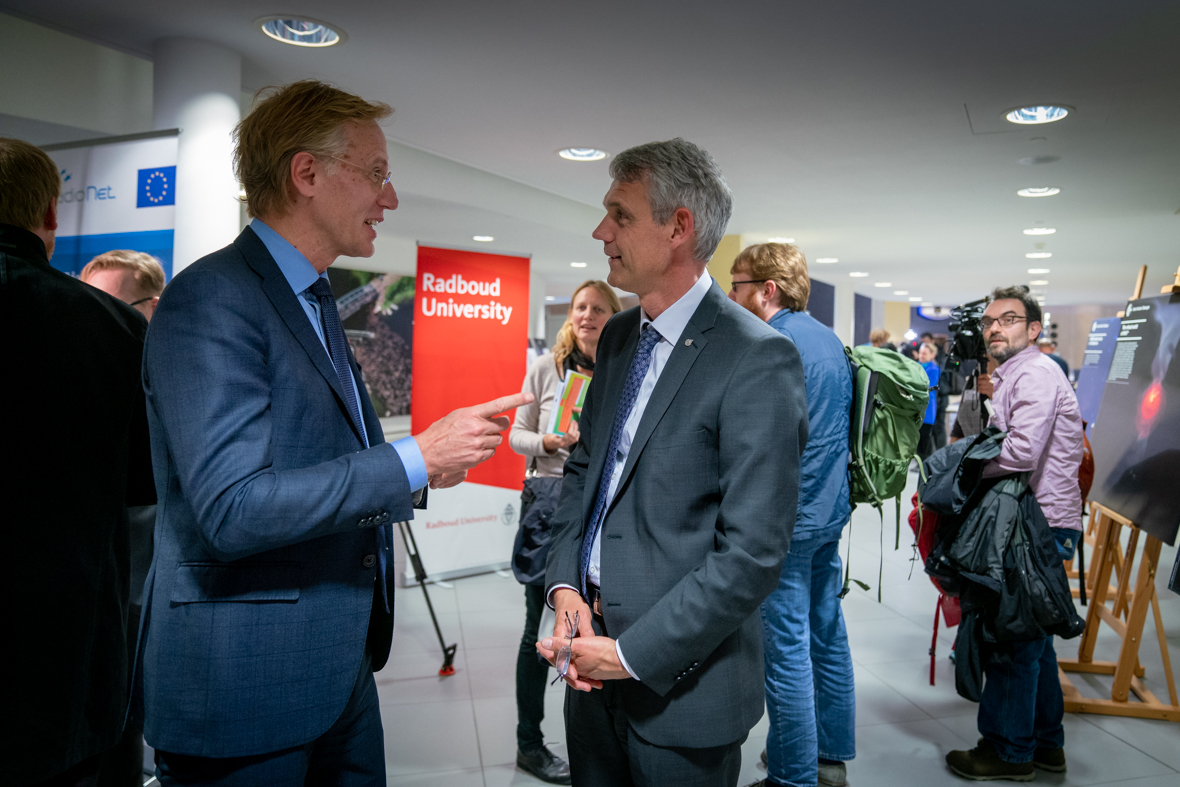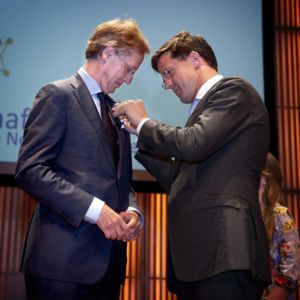Minister Dijkgraaf: ‘We are going to create more permanent contracts’
-
 Foto: Martijn Beekman/Rijksoverheid
Foto: Martijn Beekman/Rijksoverheid
Without a doubt unique – a world renowned physicist who becomes a politician. From mathematical models that represent the tiniest particles of matter to the chaotic realities of Dutch politics.
‘I’ve lived the scientific life, but now I look at it from a bird’s-eye view’, says Robbert Dijkgraaf, Minister of Education, Culture and Science. ‘I have to interact with many more different kinds of people, like my colleagues in Cabinet, those in other government ministries and MPs.’
You often underscore the importance of ‘facts’. Do you think it’s a pity that facts sometimes play such a marginal role in politics?
‘When I just started here, I kept hearing the phrase “then it becomes political”. It took me a little time to get used to that. It means that you can take all kinds of rational steps and prepare for all kinds of eventualities, until you get to a crossroads. Which road do you want to take? That is a political decision. But it also happens in our own lives. You can’t always let yourself be driven by the facts, you have to weigh things up.’
‘There are forces that are bigger than we are’
You also have to consult with others and make compromises.
‘Politics often seems to move at a snail’s pace, while time flies by very quickly. For example, we were talking about the new basic student grant that we want to roll out in September 2023. Then all of a sudden we realised: we really don’t have a moment to lose!’
How does a scientist deal with political decision making?
‘I always try to take a moment – just like in scientific research – to wipe the blackboard clean. Then we start at the beginning constructing what we are trying to do. And after that we can proceed to policy papers and decisions.’

But take the compensation for students under the student loan system, for instance. First you were given the funding, a billion euros, and only after that could you actually investigate students’ real needs.
‘It’s true, you can’t always start from scratch. Negotiations for the coalition agreement took nearly a year, so I can do little to change that. But it’s no different in scientific research. The laws of nature also deal the cards: I sometimes hoped to find a particle that ultimately turned out not to exist. There are forces that are bigger than we are.’
Just accept things, and then cheerfully move on?
‘Yes, that might be a good way of putting it.’
You just set a new trajectory for higher education and research, and distributed billions of euros. How do you weigh things up in that case?
‘For that policy a certain budget had been set aside, about a billion euros per year, and we already had various reports and requests. It required a great deal more calibration and fine tuning than the compensation for students under the student loan system. So you conduct talks and gather ideas. I always say, as minister you have the least comfortable seat: you experience all the forces and counter-forces, and that’s as it should be.’
What’s really notable is the 300 million euros per year in working capital for researchers, with half destined for lecturers who will be given permanent jobs.
‘It’s a stimulus for universities to offer permanent positions to young lecturers [usually aged 30 to 40, ed.]. We want to free up more time and space for lecturers who have little or no time for research. It’s also a way of lightening workload pressure.’
But isn’t it mostly postdocs who keep getting one temporary contract after another?
‘Those postdocs would like to have permanent contracts, which is possible if they become lecturers. So we have to create more lecturer positions too.’
Wouldn’t it be better to ‘demand’ permanent jobs instead of offering ‘stimulus’?
He smiles. ‘Additionally, we’re going to create more permanent faculty through the sector plans.’
Sector plans
Dijkgraaf has also earmarked 200 million euros per year for ‘sector plans’ in many different disciplines. The universities are in negotiations about teaching and research within the disciplines, such as humanities and natural sciences, in order to avoid overlap and complement each other.
How will the sector plans lead to more permanent jobs?
‘We’re going to set administrative objectives with the universities, and we’ll be monitoring things very closely. We want to involve those who alerted us to the need for permanent contracts.’
But you won’t be making use of fixed targets?
‘We will of course communicate our wishes. The new arrangements won’t contain any fixed numbers, but we’ll be asking a committee to monitor things.’
You recently said that universities and universities of applied sciences should really function as one institution. What did you mean?
‘We have already made a lot of progress in The Netherlands. Our country is in fact surprisingly good in collaboration. We find it really easy to ask colleagues to get involved in our work. That’s different in the US. When I was there I saw how institutions sometimes just a few kilometres apart are competing with each other in the same subject. Thanks to our superior ability to collaborate, we can handle the international competition. There’s no scientific field that we can’t keep up with. But everyone can’t do everything. We don’t all have to keep all the balls in the air, so let’s come to an agreement about it.’
Can you give an example of programmes or departments that are currently overrepresented?
‘No, I’m not going to say anything about that now. But I’ve seen how the sector plans helped in physics and chemistry. It gives a university freedom to do more in one field – say, organic chemistry – while leaving other subjects to other universities.’
‘Higher professional education holds a key position’
Universities are attracting too many students, while universities of applied sciences are experiencing regional shrinkage. Couldn’t universities of applied sciences offer academic education in regions with population decline?
‘In the fall I will be starting a preliminary study: what exactly is the role of each type of education? Higher professional education holds a key position because of its close connections with the job market and the professional depth of the programmes they offer.’
Is a new university in one of the depopulated regions a possibility? In the past, there were also professional colleges that became universities.
‘That’s a very good question, and it has to be possible to ask all the questions. Right now the universities of applied sciences are receiving 100 million euros per year to develop research with a practical focus. The idea is to develop research in professional education further and make teaching more innovative. That’s why we’re starting the professional doctorate in universities of applied sciences [the professional version of the academic PhD, ed.], for example.’

Which possibilities will you be exploring in the fall?
‘There are many barriers between the vocational colleges and higher education. Couldn’t we remove a couple of them, taking the study paths of individual students as our starting point? That’s what I want to check out. In fact, I believe that we should place senior secondary vocational education and training, higher professional education and university education on a continuum and not in a hierarchical order. I myself made the transition from academic education to higher professional education when I went to the Gerrit Rietveld Academy. That wasn’t a step down, but a step sideways.’
Will you also be starting this exploration with a clean slate?
‘Yes, it’s a good idea to look at the system with fresh eyes. What guiding principles should we use? There are all kinds of things on our wish-list that we hadn’t yet thought of when this ‘house’ was built. You could think here of such things as valorisation, knowledge security, social security, flexible education, and so on. The nice thing is that teaching faculty do often look beyond the boundaries. They are actively engaged with the future, while the structures lag behind. Renewal has to start from below, and politics has to offer space for it.’
You said that we shouldn’t arrange things in a hierarchy. But generally speaking academics earn more than those in higher professional education. So then it makes sense that people think that way, doesn’t it?
‘Reality is always more complex. It’s difficult to predict what you’re going to earn with any particular degree. You can make a lot of money in the engineering sector, at all levels. But income is not the only dimension. I talk to a lot of students who say, I want to do something later on to help society.’
‘I’m going to see how I can cushion the tuition fee rise’
I also hear them say that they would like to buy a house later on.
‘But in my discussions with students I have yet to hear someone ask, which degree can I earn the most money with later on? Of course students want a home, and a job with a future. They quite rightly have concerns. I often say that to my Cabinet colleagues: let’s look at policy as young people would look at it. Reintroduction of the basic student grant will help, but we have to stay on our toes.’
Is it true that you want to do something about the rapid 200 euro rise in tuition fees?
‘I’m going to see how I can cushion the tuition fee rise, because this is certainly a big jump.’
Students also complain about stress and performance anxiety. Your predecessor wanted to get rid of the binding recommendation on continuation of studies for those reasons. What’s your response?
‘We’re going to see whether we can move the binding recommendation to second year, so that students have more time. This strikes me as reasonable. I was shocked when I heard about the performance anxiety, mental health issues, stress and insecurity students experience, which they tell me about in our discussions. We have to be careful; we as a society can’t put unlimited pressures on our students.’
Where do you think that pressure comes from?
‘We have an educational system that is unique in the world: it’s accessible and of a very high quality. I sometimes think, why doesn’t the whole world do what we do? But it is too high pressure, with faculty who don’t have time any more to do research and students who have to finish their degrees as quickly as possible. It’s partially peer pressure. Society exerts a lot of pressure on young people, which they internalize, and ultimately they make themselves completely crazy. It’s part of my job to say, can’t we slow things down a bit? That’s why my plans also deal with student wellbeing, something that has to become a higher priority.’
And yet only a fraction of the money you disbursed last week will be spent on that.
‘Discussions about policy are often ‘material’. About money, buildings and equipment. But the immaterial aspect is also important: what’s the atmosphere, the culture, to what extent do we care about each other?’

Students were given more opportunity for input when they lost the basic student grant. Now the basic student grant is coming back. Does that mean they will have to give up their input?
‘I like to repeat: the resources that are freed up by the student loan system will remain in higher education. The basic student grant is coming back, but the extra funding will be retained. Moreover, we will now be getting a billion euro top up for lecturers. We believe student input is important, so we’re going to be looking into that.’
Why is it so difficult to set a standard across the board, for support to student participation bodies, for example?
‘There are now institutions who are doing more than we as a government would demand, and we don’t want to hold them back.’
Ministers are often ‘calling on’ or ‘encouraging’ institutions.
‘The institutions are autonomous, and you need to let things be created from below, but in my policies I certainly take responsibility at the national level. Take knowledge security, it doesn’t make sense for each research group to re-invent the wheel. We have to have some kind of national “dike watch”.’
You recently withdrew the law giving universities more control on the inflow of international students.
‘The same thing applies here. I can fill up the toolkit and then every farmer can patrol their own section of the dike, but that doesn’t mean that the dike will be well protected. We need to have a national strategy when it comes to internationalisation: what do we want to achieve together? Such a strategy is lacking right now. Nevertheless, I’m in discussions with universities about short-term solutions.’
‘It’s not enough to say that the door is open to everyone. For some people, it’s a long road to get there.’
As a minister you represent D66. How is your party’s colour visible in your policy?
‘One of D66’s strong beliefs is putting the development of the individual front and centre. Personal freedom is very important to me. Society asks for all sorts of things, but young people know quite well what they want. We can encourage them to go in a certain direction, but ultimately they decide themselves. And equal opportunity is part of that. We have a wonderful educational system, but many people fall between the cracks; it’s not for them. We have to do something about that. It’s not enough to say that the door is open to everyone. For some people, it’s a long road to get there.’
And in research?
‘That was the subject of my first public lecture as minister. Knowledge and expertise are the lifeblood of this country, but at the same time there’s a lot of pressure on science. We have to stand behind the facts and behind the researchers who present us with the facts. We can’t say, science is just another opinion, and I have an alternative report here, so now we’re even. We have to defend science.’
This article was writen by Bas Belleman/HOP



